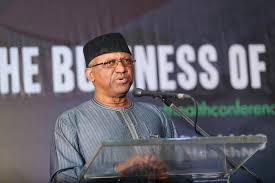There are no products in your shopping cart.
| 0 Items | £0.00 |

 HEALTH minister Dr Osagie Ehanire has announced radical plans to recruit doctors from the Nigerian diaspora as part of a programme to combat the nation's medical challenges using the services of experts from Europe and America.
HEALTH minister Dr Osagie Ehanire has announced radical plans to recruit doctors from the Nigerian diaspora as part of a programme to combat the nation's medical challenges using the services of experts from Europe and America.
Nigeria's has one of the worst health records in the world, topping the global charts for ailments like polio and death at childbirth. Hopelessly overwhelmed, the government lacks the health budget, the equipment of the personnel to deal with the problem as providing healthcare for 200m people across 774 local government areas requires massive investment, that will dwarf the current budget.
Dr Ehanire said officials of the ministry were in touch with foreign embassies for specialists who would work in hospitals across the country for specified periods. Speaking during the 2020 budget defence session, the minister said the move would strengthen the nation’s health sector.
Responding to a question about plans for curbing medical tourism, Dr Ehanire said the experts, already exposed to sophisticated practice in the advanced world, would not only attend to the health needs of Nigerians but also use the opportunity to share expertise with their local counterparts. He added that there are equally plans to make indigenous consultants and surgeons spend some time abroad and come back to improve the Nigerian healthcare system.
Dr Ehanire maintained that the country’s teaching hospitals were adequately equipped and manned by experienced and qualified doctors but noted that more work needed to be done to build the confidence of Nigerians on the facilities. He added that the sector requires more funds to also create an enabling atmosphere for Nigerian experts in the diaspora to return and render free services to the homeland.
Dr Francis Faduyile, the president of the Nigerian Medical Association (NMA), said: “Is it the 4% budgetary allocation for health? Is it the equipment that is not there and is not working?
"Where will they work with empty seats and chairs at most hospitals? The health minister needs to tell himself some truth. No doctor in the diaspora will want to come back under the present circumstances as the health system is not functioning optimally and we have to fix it and prevent brain drain before thinking of attracting doctors practising abroad.”
Also faulting the idea, a former president of the Pharmaceutical Society of Nigeria, Olumide Akintayo, added: “I hope this is not connected with the plans to sell all the teaching hospitals and federal health institutions in the name of privatisation? We should be thinking of how to improve the conditions of service of health professionals in the system and stem brain drain.
"The plan by the minister is unfortunate and ill-advised. I am sure that all health workers except the doctors will reject this plan. This is not what we need now.”
In a 2018 report on why medical personnel were leaving the country, it was noted that about 5,405 Nigerian-trained doctors and nurses were working with the British National Health Service in the United Kingdom. This figure, released by the British government, meant that Nigerian medics constituted 3.9% of the 137,000 foreign staffers of 202 nationalities working alongside British doctors and nurses.
It is believed that more Nigerian doctors could join the migration because the UK needed medics from Commonwealth countries, since some doctors in the European Union (EU) were reportedly leaving because of Brexit. Most of the Nigerian doctors and nurses were leaving because of better conditions of service and that the migration worsened the physician-patient ratio in the country from 1:4,000 to 1:5,000, contrary to the World Health Organisation’s recommended 1:600.
In the UK, the physician-patient ratio is 1:300. Figures sourced from the NMA showed that about 45,000 doctors were practising in Nigeria at present, meaning that 12% of 45,000 Nigerian doctors (5,405) were practising in the UK and the country was left with fewer than 40,000, excluding those working in the US, South Africa, Saudi Arabia and others.